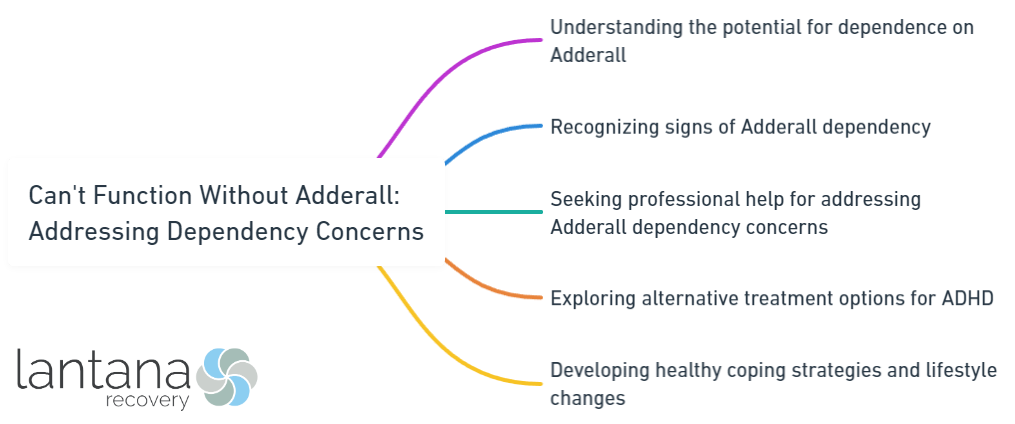Adderall, a prescription medication commonly used to treat attention deficit hyperactivity disorder (ADHD), has gained attention for its potential for dependency and misuse. Understanding the nature of Adderall and the concerns surrounding dependency is crucial for those who rely on this medication. By delving into the workings of Adderall and recognizing the signs of dependency, individuals can take the necessary steps to address these concerns. Seeking professional help, implementing tapering strategies, and exploring alternative treatment options are essential components in addressing Adderall dependency. Managing withdrawal symptoms and breaking free from dependency requires a comprehensive approach that includes maintaining a support system, adopting healthy habits, and creating new coping mechanisms. By addressing these concerns head-on, individuals can regain control of their health and well-being.

Understanding Adderall
Understanding Adderall is crucial for those considering or prescribed this medication. Adderall contains amphetamine and dextroamphetamine and is used to treat ADHD and narcolepsy. It works by enhancing brain chemicals to improve focus, attention, and impulse control in individuals with ADHD. It can also help those with narcolepsy stay awake during the day.
However, it is important to note potential side effects of Adderall. These include increased heart rate, elevated blood pressure, insomnia, decreased appetite, and dry mouth. Taking Adderall as prescribed and monitoring side effects closely is crucial.
Adderall is a controlled substance due to its potential for misuse and dependency. Misuse, such as taking higher doses without a prescription or combining it with other substances, can lead to serious health risks and dependency.
Jennifer, who was diagnosed with ADHD, found Adderall initially improved her focus and organization. However, she became dependent and struggled to perform tasks without it. Seeking help from her healthcare provider, Jennifer developed a plan to gradually reduce and discontinue Adderall. Through therapy and alternative coping strategies, she managed her ADHD symptoms without relying on Adderall. Her story emphasizes the importance of understanding the risks and seeking professional guidance when necessary.
What is Adderall?
Adderall is a prescription medication for ADHD and narcolepsy. It is a stimulant that increases certain brain chemicals to improve focus and attention.
Adderall contains amphetamine and dextroamphetamine, which stimulate the central nervous system. It helps people with ADHD pay attention, stay focused, and control impulsive behaviors.
It is important to use Adderall under a healthcare professional’s guidance and as prescribed. It is not for recreational use or self-medication.
While Adderall can treat ADHD symptoms, it has risks. Side effects include increased heart rate, elevated blood pressure, insomnia, loss of appetite, and mood changes. It can also lead to dependence and abuse, so it is a controlled substance.
If taking Adderall, follow the prescribed dosage and regularly communicate with a healthcare professional for safe and appropriate use.
Adderall was FDA approved in 1996 for ADHD treatment. It is commonly prescribed due to its effectiveness in improving focus and reducing hyperactivity. However, recreational use and dependency concerns have led to increased awareness and monitoring by healthcare professionals. They continuously evaluate the benefits and risks to ensure responsible use for those who genuinely need it.
How does Adderall work?
Adderall is a medication prescribed for attention deficit hyperactivity disorder (ADHD). How does Adderall work? Studies have now shown that it increases dopamine and norepinephrine levels in the brain, improving focus, attention, and impulse control. By increasing the release of norepinephrine, it enhances wakefulness and cognitive function, allowing individuals to better manage their activities. However, Adderall should only be used under the guidance of a healthcare professional. The dosage and duration of treatment should be tailored to each individual’s needs and closely monitored to minimize risks or side effects. Understanding how Adderall works can help individuals make informed decisions and work with their healthcare provider for the best outcomes.

Can’t Function Without Adderall
In a world that increasingly demands peak performance, there is a growing concern about our dependency on Adderall. So, let’s dive into the “Can’t Function Without Adderall” section and explore the intricacies of this topic. We’ll start by recognizing the signs of dependency on Adderall and then move on to exploring the symptoms that may indicate an unhealthy reliance on this medication. It’s time to take a closer look at the important issues surrounding Adderall dependency and find ways to address them.
Recognizing Dependency on Adderall
Recognizing Dependency on Adderall is vital for addressing addiction concerns and seeking appropriate help. It is crucial to be aware of the signs and symptoms associated with Adderall dependency.
1. Increased Tolerance: Since Adderall makes you feel calm and focused, individuals, over time, may develop a tolerance to Adderall, requiring higher doses for desired effects.
2. Withdrawal Symptoms: When attempting to quit or reduce Adderall intake, withdrawal symptoms may occur, including fatigue, depression, irritability, and difficulty concentrating.
3. Loss of Control: Inability to limit or control Adderall use is a key indicator of dependency. People struggle to cut back or stop using the drug despite negative consequences.
4. Preoccupation with Adderall: Dependent individuals may spend significant time thinking about the drug, obtaining it, or planning their next dosage.
5. Neglecting Responsibilities: Adderall dependency can lead to neglecting important responsibilities such as work, school, or personal relationships.
6. Social and Interpersonal Problems: Adderall dependency may result in difficulties in relationships, withdrawal from social activities, or changes in social circles.
7. Using Adderall for Non-Medical Reasons: Recreational or non-medical use of Adderall is a warning sign of potential dependency.
Recognizing these signs allows individuals to seek professional help and take necessary steps towards addressing their dependency on Adderall. It is important to seek assistance from healthcare professionals to manage and overcome this addiction.
Symptoms of Adderall Dependency
Adderall dependency symptoms can vary from person to person, but it is important to be aware of some common signs:
- Increased tolerance: Some individuals may require higher doses of Adderall in order to achieve the same effects.
- Withdrawal symptoms: When someone becomes dependent on Adderall, stopping or reducing the dosage can result in fatigue, irritability, depression, and difficulty concentrating.
- Craving for Adderall: There is a strong desire or urge to use the drug, even if it leads to negative consequences.
- Loss of control: The person finds it difficult to control or reduce their use of Adderall, despite wanting to.
- Neglecting responsibilities: Work, academic, or personal responsibilities are disregarded in favor of Adderall use.
- Social withdrawal: Relationships suffer as the individual’s focus shifts towards obtaining and using Adderall.
- Financial difficulties: An Adderall dependency can lead to financial strain due to excessive spending on the drug.
Experiencing these symptoms does not necessarily indicate a dependency on Adderall. However, if you notice multiple signs, it is recommended to seek professional help.

Addressing Dependency Concerns
Addressing dependency concerns relating to Adderall is crucial for individuals reliant on the medication. In this section, we’ll explore various approaches to tackle this issue. From seeking professional help to considering tapering off Adderall or exploring alternative treatment options, we’ll provide insights and perspectives that can guide individuals towards a healthier and more balanced lifestyle. Emphasizing the importance of addressing dependency concerns, this section aims to empower readers to make informed decisions about their Adderall use.
Seeking Professional Help
Seeking professional help is of utmost importance for individuals struggling with Adderall dependency. It is crucial to understand that professional assistance is necessary to effectively address the complex issues surrounding dependency on this medication.
Doctors, psychiatrists, and addiction specialists are experienced professionals who can offer valuable guidance and support throughout the recovery process. They possess the knowledge and expertise to evaluate the severity of the dependency and develop a personalized treatment plan. By considering dosage, duration of use, and individual needs, these professionals can provide personalized strategies to help individuals safely and successfully taper off Adderall.
Furthermore, seeking professional help to get rid of the anxiety from Adderall as through therapy, individuals can acquire coping mechanisms, address co-occurring mental health disorders, and develop healthy habits that contribute to overall well-being.
Seeking professional help is an indispensable step towards breaking free from Adderall dependency and establishing a healthier, drug-free life.
Tapering Off Adderall
When gradually reducing the dosage of Adderall, it is crucial to do so under the supervision of a healthcare professional. Follow these steps to taper off:
1. Consult your doctor: Have a discussion with your doctor about your intention to taper off Adderall. They will provide guidance and create a personalized tapering schedule.
2. Stick to the schedule: Follow the tapering schedule given by your doctor. Decrease the Adderall dosage gradually over time.
3. Watch for withdrawal symptoms: Pay attention to any withdrawal symptoms that may occur during the tapering process, such as fatigue, irritability, difficulty focusing, or mood swings.
4. Adjust the plan if necessary: If you experience severe withdrawal symptoms or find the tapering process challenging, consult your doctor. They may need to make adjustments to the tapering schedule or explore alternative options.
5. Take care of yourself: Get enough rest, maintain a healthy diet, and engage in stress-reducing activities like exercise or meditation while tapering off.
6. Seek support: Reach out to friends, family, or support groups who can offer encouragement and understanding throughout the tapering process.
7. Regular check-ups: Keep scheduled appointments with your doctor to monitor progress, address any concerns, and make necessary adjustments.
8. Practice patience: Tapering off Adderall is a gradual process that requires patience. It may take time for your body to adjust, but with the right support and guidance, you can successfully taper off the medication.
According to a study published in Molecular Psychiatry, “The acute administration of amphetamine produces a wide range of dose-dependent behavioral changes, including increased arousal or wakefulness, anorexia, hyperactivity, perseverative movements, and, in particular, a state of pleasurable affect, elation, and euphoria, which can lead to the abuse of the drug.” (Potential Adverse Effects of Amphetamine Treatment on Brain and Behavior: A Review, Berman et al., 2009)
Exploring Alternatives
When addressing concerns about dependency on Adderall, it is important to explore alternative options. Consulting with a healthcare professional before making any changes to medication is crucial. Here are some alternatives to consider:
1. Lifestyle changes: Make adjustments in your daily routine, such as regular exercise, stress management techniques, a healthy diet, and sufficient sleep. These natural methods can improve focus and productivity.
2. Cognitive behavioral therapy (CBT): This therapy focuses on identifying and modifying negative patterns of thinking and behavior. It helps individuals develop healthier coping mechanisms and enhance overall well-being.
3. Non-stimulant medications: In some cases, healthcare professionals may prescribe non-stimulant medications as alternatives to Adderall, based on individual needs.
4. Natural supplements: Some individuals find relief through the use of natural supplements like omega-3 fatty acids, vitamin B12, or herbal remedies like ginkgo biloba or rhodiola rosea. However, it is important to discuss supplement use with a healthcare professional before incorporating them into your routine.
5. Behavioral strategies: Implement strategies such as breaking tasks into smaller steps, setting goals, using organizational tools, and creating a structured environment to improve focus and productivity.
Ultimately, the most suitable alternative will depend on individual circumstances and should be determined in consultation with a healthcare professional. Exploring these alternatives provides options for addressing concerns about Adderall dependency and finding the best approach.
In the field of mental health, the search for alternative treatments has always been a priority. As our understanding of neurochemistry and behavior has evolved, approaches to managing conditions like ADHD have also evolved. Non-stimulant medications and cognitive-behavioral therapy have opened new avenues for individuals seeking alternatives to Adderall. Research on the effectiveness of lifestyle changes and natural supplements has expanded options further. Ongoing advancements in this field promise continued progress in finding alternative solutions for those who require alternatives to Adderall.

Photo Credits: Www.Lantanarecovery.Com by Jesse Thompson
Managing Withdrawal Symptoms
Withdrawal symptoms can be a challenging part of overcoming dependency on Adderall. In this section, we’ll explore the different symptoms that individuals commonly experience when quitting the medication. Additionally, we’ll provide some helpful tips to cope with these symptoms, offering practical strategies to ease the discomfort of withdrawal. So, if you’re ready to learn more about managing withdrawal from Adderall, read on for some useful insights and guidance.
Common Withdrawal Symptoms
Common withdrawal symptoms may occur when stopping the use of Adderall. These can include:
- Fatigue: Individuals may experience extreme tiredness and lack of energy as their body adjusts to functioning without Adderall.
- Depression: Chemical changes in the brain after stopping Adderall can lead to feelings of sadness and low mood.
- Anxiety: Withdrawal from Adderall can result in increased feelings of anxiety and restlessness.
- Irritability: The withdrawal process can make individuals easily agitated and irritable.
- Difficulty concentrating: Stopping Adderall can make it challenging for individuals with ADHD to concentrate and focus.
- Increased appetite: Without Adderall, individuals may experience an increase in hunger and cravings due to appetite suppression.
- Sleep disturbances: Adderall withdrawal can disrupt sleep patterns, causing difficulties falling asleep or staying asleep.
- Cravings: Some individuals may strongly crave Adderall as their body adjusts to its absence.
It’s important to note that the intensity and duration of these withdrawal symptoms can vary. If someone experiences severe or prolonged withdrawal symptoms, professional help is recommended.
Tips for Coping with Withdrawal
Coping with withdrawal from Adderall can be challenging, but there are strategies that can help ease the process. Here are some useful tips for effectively coping with withdrawal:
– Stay hydrated: Drink at least 8 cups of water per day to avoid dehydration and alleviate worsened withdrawal symptoms.
– Get sufficient rest: Make rest a priority and establish a calming bedtime routine to aid better sleep during the withdrawal phase.
– Follow a balanced diet: Incorporate foods that are rich in vitamins, minerals, and antioxidants to support your body during the withdrawal period.
– Engage in regular exercise: Aim for at least 30 minutes of moderate exercise, such as brisk walking or cycling, on most days of the week. This can help reduce withdrawal symptoms.
– Practice stress-reducing techniques: Manage stress through deep breathing, meditation, and mindfulness. These techniques can alleviate anxiety and promote relaxation while going through withdrawal.
– Seek support: Reach out to trusted friends, family members, or support groups for encouragement and understanding during the withdrawal process.
– Be patient with yourself: Remember that withdrawal is a gradual process and each person’s experience is different. Be kind and patient with yourself as you navigate through this challenging time.
By implementing these tips, you can effectively cope with the withdrawal from Adderall and support your journey towards breaking free from dependency.

Photo Credits: Www.Lantanarecovery.Com by Patrick Roberts
Breaking Free from Adderall Dependency
Breaking free from Adderall dependency is a crucial journey towards reclaiming control and improving overall well-being. In this section, we will explore the key steps to break free, from maintaining a strong support system to adopting healthier habits and creating new coping mechanisms. Join us as we navigate this path of recovery, providing insights and strategies to regain independence and live a fulfilling life beyond Adderall.
Maintaining a Support System
Maintaining a support system is crucial for addressing Adderall dependency. Here are key steps to consider:
- Reach out to loved ones: Share your struggles with trusted family members or friends who can provide emotional support.
- Join a support group: Seek out local or online support groups for individuals dealing with Adderall dependency. Connecting with others with similar experiences can provide valuable insight and encouragement.
- Involve a therapist or counselor: Seek professional assistance from a therapist or counselor at an outpatient drug rehab who specializes in addiction. They can offer guidance, coping strategies, and personalized treatment plans.
- Utilize existing resources: Research local addiction recovery centers, hotlines, or helplines that provide support and guidance for individuals struggling with Adderall dependency.
- Develop a healthy routine: Establish daily habits that promote physical and mental well-being. This can include regular exercise, a balanced diet, and sufficient sleep.
- Practice self-care: Engage in activities that bring joy and relaxation, such as meditation, hobbies, or spending time in nature. Prioritizing self-care is essential during recovery.
- Establish boundaries: Set boundaries with individuals who may enable or encourage Adderall dependency. Surround yourself with supportive and understanding individuals who encourage your recovery journey.
- Stay accountable: Regularly check in with a trusted individual who can help you stay accountable and monitor your progress. This could be a therapist, sponsor, or supportive friend.
Maintaining a strong support system is crucial for long-term success in breaking free from Adderall dependency. By reaching out for support, engaging in self-care, and utilizing available resources, individuals can navigate the challenges of recovery with support and encouragement.
Adopting Healthy Habits
Adopting healthy habits is crucial when it comes to addressing concerns related to dependency on Adderall. By seamlessly incorporating these habits into your daily life, you can significantly enhance your well-being and decrease your reliance on the medication.
1. Engage in regular exercise: Consistently engaging in physical activity not only improves your physical health but also enhances your mental well-being. Strive to dedicate at least 30 minutes to moderate-intensity exercise, such as brisk walking or cycling, on most days.
2. Maintain a balanced diet: Optimal health requires a nutritious and well-balanced diet. Ensure that your meals include a variety of fruits, vegetables, whole grains, lean proteins, and healthy fats. It’s important to avoid processed foods and sugary beverages.
3. Get enough sleep: Sufficient sleep is vital for both your body’s recovery and cognitive function. Aim for 7-9 hours of uninterrupted sleep each night. Establishing a calming bedtime routine and creating a comfortable sleep environment can be helpful.
4. Manage stress: Discover healthy ways to alleviate stress, such as practicing mindfulness, engaging in deep breathing exercises, or participating in enjoyable activities. Consider incorporating stress-reducing techniques like yoga or meditation into your daily routine. According to a study exploring benefits of mindfulness meditation for ADHD, certain meditative practices improve attention and may ameliorate the symptoms of ADHD by activating brain regions implicated in both sustaining and directing attention.
5. Seek social support: Surround yourself with a strong support system of understanding friends, family, or support groups who can provide encouragement throughout your journey. Regularly connecting with individuals who can offer guidance and motivation is valuable.
6. Limit stimulants: Minimize or avoid the consumption of stimulants like caffeine and nicotine as they can disrupt sleep patterns and exacerbate anxiety or restlessness.
By embracing these healthy habits, you can significantly improve your overall well-being and reduce your dependence on Adderall. Remember the importance of seeking professional assistance and exploring alternative treatment options in conjunction with practicing these habits to effectively address dependency concerns. Keep in mind that everyone’s journey is unique, and finding the approach that works best for you may require patience and persistence.
Creating New Coping Mechanisms
Creating new coping mechanisms can be essential in breaking free from dependency on Adderall. When considering strategies to achieve this, keep in mind the following:
1. Identifying triggers: Take the time to recognize situations or emotions that tend to lead to relying on Adderall. This awareness will help you develop alternative coping strategies.
2. Practicing stress management techniques: Incorporate activities like deep breathing exercises, meditation, or engaging hobbies into your routine as healthy ways to manage stress.
3. Building a support system: Surround yourself with supportive friends, family, or a therapist who can offer guidance and encouragement in your journey to break free from Adderall dependency.
4. Exploring alternative treatments: Consider options like cognitive-behavioral therapy or mindfulness-based interventions to address underlying issues and develop healthier coping mechanisms.
5. Creating a routine: Establish a structured daily routine that includes regular exercise, nutritious eating, and sufficient sleep. These habits promote overall well-being and reduce the need for reliance on Adderall.
6. Engaging in self-care activities: Make sure to prioritize self-care and incorporate activities that bring you joy, relaxation, and fulfillment, such as hobbies and self-reflection.
7. Setting realistic goals: Break down big goals into smaller, achievable steps. Reward yourself when you reach milestones along the way.
Remember, breaking free from Adderall dependency takes time and effort. Be patient and compassionate with yourself as you embark on this journey of creating new coping mechanisms.
Frequently Asked Questions
What are prescription stimulants and how are they used to treat ADHD?
Prescription stimulants, such as Adderall, Ritalin, Concerta, and Dexedrine, are medications commonly used to treat attention deficit hyperactivity disorder (ADHD). These medications work by increasing the availability of dopamine in the brain, which helps individuals with ADHD feel more focused. They are prescribed for long-term treatment and can improve ADHD symptoms in both children and adults.
Are prescription stimulants safe to use? Have there been any safety studies conducted?
Prescription stimulants have been widely studied and proven to be safe and effective when used as prescribed. However, there has been an increase in the misuse of these medications, particularly among high school and college students, athletes, and individuals without ADHD. It is important to educate individuals about the serious consequences that can arise from using stimulants for non-medical purposes, such as psychosis, cardiovascular problems, and even sudden death. There is a need for long-term safety studies and continued education on the health risks associated with misuse of stimulants.
What are the physical side effects and adverse effects of Adderall use?
Adderall use can cause various physical side effects and adverse effects. These can include cardiovascular complications, stomach issues, loss of appetite, changes in blood sugar levels, and sleep disturbances. Long-term use of Adderall can also lead to physical dependency, where the brain becomes reliant on the drug to manage neurotransmitter levels. It is important to note that Adderall should only be used under medical supervision and as prescribed to minimize the potential for adverse effects.
How does the dopamine transporter affect the effects of psychostimulant drugs like Adderall?
Psychostimulant drugs like Adderall work by affecting the dopamine transporter in the brain. Adderall, which is a mixture of amphetamines, competes with dopamine for entry into the brain by blocking the dopamine transporter. This leads to increased dopamine levels in the brain, addressing deficits in individuals with ADHD. However, in individuals without ADHD, Adderall can disrupt the dopamine transporter, causing excess dopamine in the synapse and leading to euphoria and increased wakefulness.
What are the risks of drug dependence and addiction associated with Adderall use?
Adderall use, especially when misused or used without a prescription, can lead to drug dependence and addiction. Long-term use of Adderall can result in physical dependency, as the brain becomes reliant on the drug to manage neurotransmitter levels. Abruptly stopping Adderall can lead to withdrawal symptoms, such as cravings, fatigue, panic attacks, and depression. Seeking outside help, such as a treatment center, can make the process of overcoming an addiction to Adderall easier and more successful. Psychotherapy and behavioral therapy can also help address the underlying reasons for the addiction and provide coping skills for a drug-free life.
What are the recommended strategies for coping with Adderall withdrawal?
Adderall withdrawal can be uncomfortable, but there are strategies that can help reduce discomfort. These strategies include seeking social support, taking time off to rest, dealing with cravings, staying hydrated and nourished, seeking comfort, staying active, and potentially using over-the-counter pain relievers or sleep aids. It is recommended to talk to a doctor before stopping Adderall, as they can provide support and guidance. Treatment for Adderall withdrawal may require a comprehensive addiction treatment plan, especially for individuals who have been misusing the drug.









